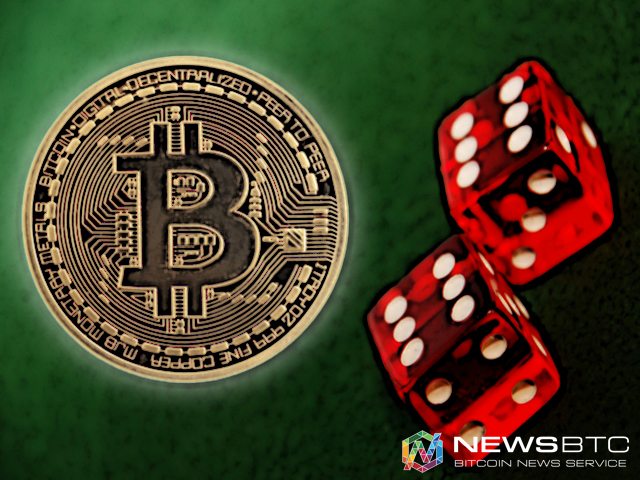Bitcoin has risen to particular prominence over 2016, as the digital currency continues to increase its profile. For the first time, it is gaining mainstream acceptance as a form of payment, and while the Bitcoin market remains volatility, it’s fast becoming an acceptable way to transact for online services and goods.
The casino industry has not been immune to this surge in interest in Bitcoin. Traditionally quick to embrace emerging technologies, casinos have been open to accepting deposits and withdrawals in Bitcoin, and it continues to gain a foothold in the market as the newest way to pay.
But as Bitcoin casinos start to emerge, and more established brands pick up on the growth in interest in Bitcoin, it remains to be seen whether we are witnessing a truly breakout phenomenon, or something of a flash in the pan. As more individuals engage in Bitcoin transactions, and more casinos introduce Bitcoin as an acceptable way to deposit and withdraw from their gaming accounts, what does the future look like for gamblers using this decentralised currency?
What is Bitcoin?
Bitcoin is a decentralised, digital currency with roots in the dark web. Originally devised as an alternative to government-backed international currencies, Bitcoin was setup as a secure digital alternative that could be traded free from external influence to establish a true value. Today, it has moved from the shadows into the mainstream, and an increasing number of individuals, companies and even governments are now moving to adopt Bitcoin infrastructure in recognition of its success.
Bitcoin is unlike other currencies in that there is no physical token of value – instead, amounts are transacted through a ledger known as the blockchain, which records transactions to effectively keep track of different balances in Bitcoin.
Bitcoins are mined, rather than minted, with encrypted strings creating the value. They are then traded in the secondary market through Bitcoin exchanges, where their value relative to existing international currencies is established. For those holding Bitcoin, fluctuations in price can increase or decrease the real value of the currency on a daily basis, and because it is held outside of the conventional banking structure, it must be converted into a local currency before its value becomes more tangible.
The concept has proved increasingly popular, and in late 2016, levels of trading volumes in Bitcoin caused the market to surge well past the $1,000 mark for a single Bitcoin. At the same time, Bitcoin as a currency has gained much wider recognition as an alternative way to pay online.
Not every casino currently supports Bitcoin. However, a number of early adopters have emerged, including some casinos exclusively geared up to handling Bitcoin transactions. So are there particular synergies that match the needs of the online casino industry and individual players with the benefits of Bitcoin, and can we expect to see further adoption in the near future?
Why is Bitcoin Valuable to Online Casino Players?
Bitcoin has several unique properties that makes it a particularly attractive currency for online casino gamblers. Firstly, when you’re transacting in Bitcoin, you’re not giving out your sensitive banking details to the casino – an important concern for those who value their privacy and security. Without the relevant key to unlock the transaction, Bitcoin trades are entirely secure, recorded in the distributed ledger and reflected within the e-wallets of both the sender and receiver.
Secondly, Bitcoin remains a currency that isn’t widely accepted, and obviously it can only be spent online, or converted to a local base currency to withdraw the funds. This makes it a good option for online casino gambling – by being able to load in Bitcoin to your gaming account, you’ve got another option for using these funds denominated in Bitcoin, without the need to actually convert the currency through an exchange.
As Bitcoin becomes more widely accepted, both at online casinos and retailers more broadly, it will become even more useful for casinos and players alike. At the moment, the uncertainty and relatively niche nature of Bitcoin means it still remains some way off being a default payment method – though the signs for future uptake already look promising.
The Stumbling Block: Acceptance
It’s clear that Bitcoin is already proving an influential force amongst online casinos, and indeed online service providers and retailers more broadly. But for now, there remains a single major issue that’s standing in the way of its mass adoption.
When you pay with a recognised international currency, through a debit card or through Paypal funds or similar, you’re able to buy pretty much anything you want, so long as it’s legal. Online, your money will be accepted through e-commerce stores, and you’ll have very little difficulty finding an online casino willing to accept your deposit.
This is unfortunately not yet the case with Bitcoin. In particular, the big boys of the industry like partycasino have yet to announce they will accept Bitcoin. This reflects the broader position across the online economy, where major retailers are, by and large, still not able to accept transactions in Bitcoin.
Before that can happen, the currency must continue to prove itself, and gain the trust and support of more consumers. At this stage, you can bet the major operators won’t be too far behind in enabling Bitcoin payments.
For the time being, it remains an unstable currency based on a new technology. As it continues to mature and develop, it looks certain that the growth of Bitcoin is providing a window into a possible decentralised currency future, both for online casinos and players alike.
